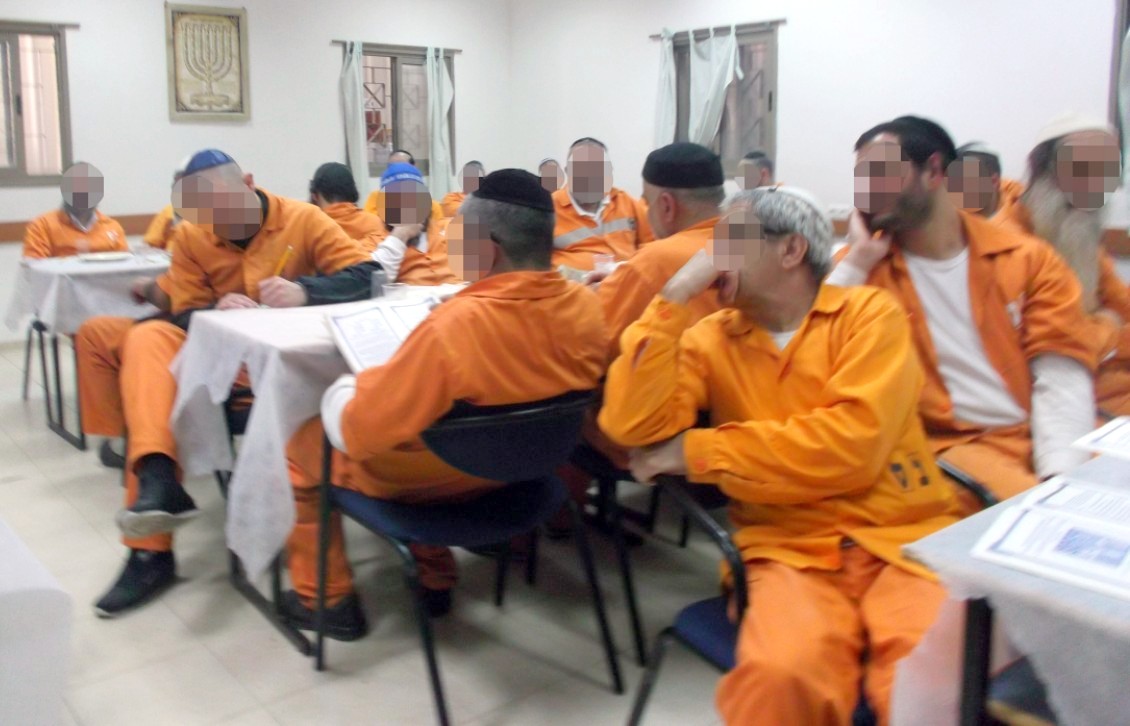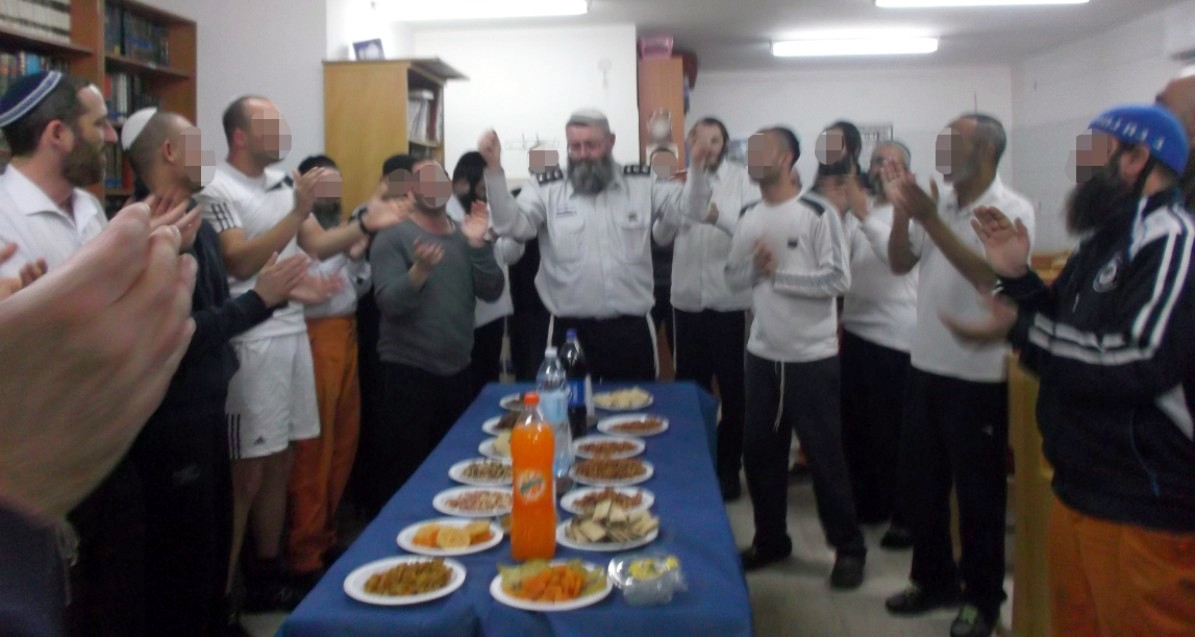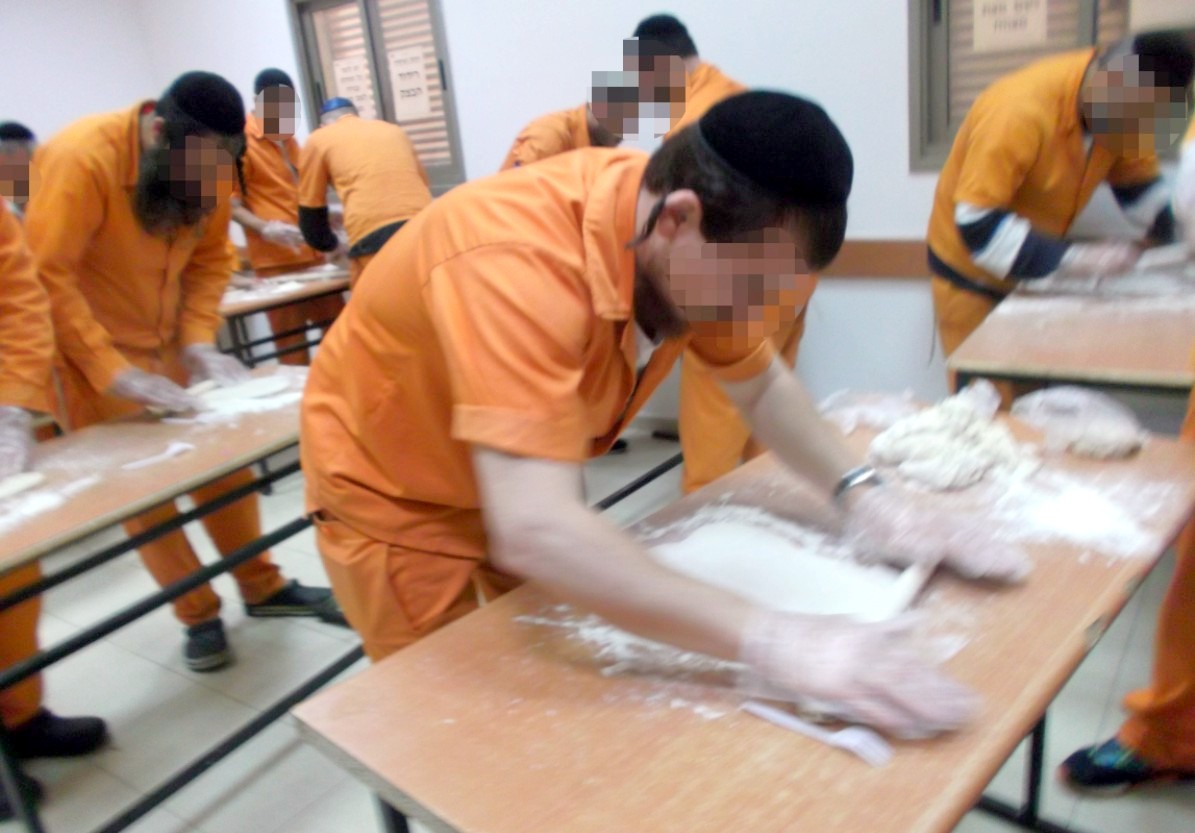"An Inmate Burst in Anger, He Couldn't Believe He'd Spend Passover Night in Prison"
How do people who have lost their freedom cope with the Festival of Freedom? Yonah Yoniov, the rabbi of Dekel Prison in Be'er Sheva, provides a fascinating insight into the internal conflicts behind bars.


It's easy to feel liberated while sitting at home in a well-lit room. The table is gloriously set with sparkling utensils, new clothes are neatly pressed, and supported by the presence of family.
Feeling freedom is much harder in prison. Despite the efforts of the Prison Service, the table in prison won't be as nice as at home, the prisoner's attire certainly won't be, and most significantly, family members will be missing around the table.
'The pains of imprisonment,' as Rabbi Yonah Yoniov, the rabbi of Dekel Prison in Be'er Sheva, calls them, intensify as a holiday approaches, especially when Passover night arrives—a holiday of family, tradition, and above all, freedom—the primary theme missing from the lives of prisoners. Or is it truly absent?
Perhaps one can achieve freedom even in prison.
In an incredible workshop held at Dekel Prison thirty days before the holiday, the topic of freedom was discussed—how to be a free person in prison, along with other key themes of Passover night, like 'the bitter herbs'—both practically and in life, the duty of 'telling' in life, and more.
Initially, the discussions prompted many cynical reactions mixed with typical dark humor, but gradually a change occurred. The answers from the inmates, who spoke of inner and essential freedom even amidst physical captivity, were astonishing.
And if in prison one can feel freedom, surely we can rise above our own private and personal shackles.
The Bitter Herbs, the Leaven, and the Telling in Daily Life
"In the Prison Service Rabbinate, there's a branch named 'Tikun' meaning 'correction,' which deals with integrating Torah subjects learned formally or informally into the prison's daily life, focusing on practical tools for correction," says Rabbi Yonah Yoniov.
"We have a workshop called 'Exodus from Egypt' that runs across 33 Prison Service seminaries. The workshop is built around the laws and customs of the holiday and Passover night. The goal is to undergo a process related to Passover and oneself. Its uniqueness lies in digesting all sources from the Torah and sages' words into practical tools for demonstration and dissemination. It's a very strong combination.
"At our prison—'Dekel,' we've seen over the years that Passover night is very hard on inmates. It's a night full of customs, family, and distinct personal traditions unique to each inmate. This was our starting point, to dedicate special preparation time for this holiday."

The main theme of the workshop, unsurprisingly, was...freedom. "Everyone should feel as if they themselves left Egypt, to become a 'free person'. But how does one achieve freedom from behind bars? We also explored the opposite question: how can a free person, who never experienced prison, attain complete freedom? It was from this question that our journey began."
Thirty days before the holiday, Dekel Prison started preparing for Passover night immediately after Purim, a special workshop commenced, consisting of eight meetings at various levels and groups. The human classification in prison is not easy; connecting people with seemingly no common ground: background, age, ethnicity, community. Everything is different.
The topics were chosen from the Passover Haggadah with a new perspective, touching the pulse of the inmates' lives, and essentially, the pulse of human life.
When Inmates Cleansed the Leaven Within
One session focused on 'the bitter herbs'—the difficulty and servitude inherent to Passover night and life itself. After all, 'Whoever hasn't said Pesach, Matzah, and Maror hasn't fulfilled his obligation.' One cannot achieve complete redemption without undergoing a process of exile.
Another session focused on the 'Telling' on Passover night and in life: communication between a person and themselves/ their companion, and dialogue between a person and the Creator. The workshop discussed 'Hallel' and 'Nirtzah,' deriving relevant meaning for everyday life.
"We delved into the cleansing of leaven. The Mishnah states 'inspect the leaven,' which seems puzzling. One might think it should say 'burn the leaven' or 'inspect the house,' what is there to inspect in leaven? It proves that even leaven has a positive aspect that needs to be directed. The Ben Ish Chai says, 'Separate evil from the evil inclination,' implying there's also a good side. Rabbi Nachman explains that 'hindrances' suggest 'pleasantness'; after a person is hindered by something and overcomes it, they reach a state of pleasantness—of joy."
"The emotional stage," continues Rabbi Yoniov, "was when each inmate wrote about points of leaven within themselves that they wanted to cleanse—a topic indicated in sage texts. Amazing things emerged; people wrote about anger, jealousy, pride. Less about the direct points that led them to prison and more about the root causes—faulty attributes that directed them to actions. In my view, this significant process, because when one reaches the root, therein lies the difficult work and the correction. These were very strong moments."
"The Inmates Shared the Good They See in Imprisonment"
In the concluding workshop session, equipment for baking matzot was brought to the prison, and the inmates experienced genuine matzah baking. They then went on to a model Seder table. "Around laid-out tables," Rabbi Yoniov explains, "with musical accompaniment by the inmates themselves, we summarized the workshop, closing with the merit of achieving freedom even in imprisonment. Many spoke about the point that true freedom is liberated from internal shackles—attributes, addiction, and they left with wonderful insights."
Were there none who objected?
"There were some who had difficulty accepting the response; one inmate burst into anger, it was his first imprisonment and he couldn't believe he’d spend Passover night in prison. But in the end, everyone received an internal response.
Talks revolved around faith, that Hashem doesn't do evil, everything is good. We are left to uncover the good that can be obtained within prison. If I approach from such a place, I liberate myself from external bondage. I’m occupied with personal growth, flourishing despite the fence outside, thus I am a free person."
And was it satisfying for them?
"Definitely. They shared the good they see in imprisonment: they learn to appreciate simple things they previously overlooked, they value family structure, one said thanks to prison, he's detoxed from alcohol, another discussed spiritual lessons he's strengthened in. There were amazing revelations.
"The perception was that 'freedom' isn't bound by location; 'freedom' is a state where a person decides to be mentally, spiritually. If I utilize my time, if I don’t succumb to despair and conversely, I progress—then I am a free person. We illustrated this with the case of the leper. Leaving the camp isn’t just punishment but a time for spiritual reflection and cleansing. Even detention in prison away from the outside world—it’s a personal choice how I spend that period."
Just make sure they don’t want to stay in prison...
"Of course, we don’t advocate staying in prison; we encourage utilizing the time; the motto is prison is not just punishment but also an opportunity. You can enter in one way and leave as someone different, better."

Can you share a story about one of the inmates?
"In one of the workshop's sessions, an inmate who was set to go home for Passover night spoke, few get such a permit. They have to meet many criteria. He expressed an opinion on feeling free in prison, and all around were angry with him: 'You have no say, you won’t experience Passover night in prison.' He was a strong testimony to the meaningful process the inmates went through; he said he would leave for Passover night because parents wanted him with them. For him, he would stay in prison for Passover night. At home, there isn't so much a spiritual atmosphere and structured prayers, but in prison, he can have a more spiritual experience."
After all, aren’t there those who'd prefer to sleep through Passover night?
"Some choose to escape; it’s the easiest way. Some avoid calling home on the holiday eve to spare the difficulty. On the other hand, the Prison Service is very much engaged with religious rights, and Passover night is one of those nights when inmates are allowed to sit together for a prolonged time, with all the holiday symbols. They receive everything possible under prison conditions, nice tablecloths, four cups, supervised matzot in abundance. Often, they get what they didn't have at home. Also, the atmosphere of unity encourages participation; in religious wards, the community is very strong, and a rabbi conducts the Seder. Hence, there are plenty of reasons to join, materially, socially, spiritually, and I hope our preparation will lead them to full participation, and even joy."
"The important process in my view was that many staff members—seminary guides, teachers, rabbis who led the workshop, also shared how they underwent change due to the workshop. Their understanding of what true freedom sharpened, they gained much more meaning concerning Passover night. It became very clear to us what the essence of 'One must view himself as if he came out of Egypt' is—not only from the narrow scope of 'I am free, no one subjugates me' but from aspiration to grasp where I feel limited, something I may have given up on—in all realms, and liberate from it, escape my private constraints. The fact the staff was so influenced made us happy; you come to give—and instead receive."
This shows people spoke from the heart, they believed in what they were saying.
"Anyone working with inmates must bring inner truth. Inmates are a wide and diverse audience; everyone comes with their background and professionalism; it’s a serious charge, one cannot take this lightly. I think if we don’t believe in the message and aren’t prepared, it won’t work. Moreover, the prison audience is a captive audience, but they don't behave as captives. On the contrary—the openness there is very striking. There are no masks in prison, no games of honor there, they don’t absorb every beautiful message delivered; they need something that speaks to them, or they won't listen, you must come prepared.
"This belief in capability and the power of will is crucial to everyone, especially inmates. Many prisoners think that if labeled as an inmate, they’re marked, their image is ruined. Thus, they relinquish their capacity to change. We discussed the desire to renew, the point of believing in oneself anew. If Hashem believes in me? Then I can believe in myself too. This point strengthens during Passover night. Passover night provides an opportunity to attain freedom, sanctify, purify, and as Israel did during the Exodus—open a new page."

